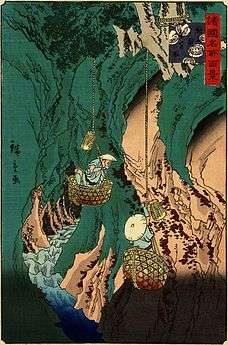Umbilicaria esculenta
Umbilicaria esculenta is a lichen of the genus Umbilicaria that grows on rocks, also known as rock tripe. It can be found in East Asia including in China, Japan, and Korea. It is edible when properly prepared and has been used as a food source and medicine. It is called iwatake (kanji: 岩茸 or 石茸) in Japanese and seogi (hangul: 석이; hanja: 石耳; literally "stone ear" or "rock ear") or seogi beoseot (hangul: 석이버섯; literally "stone ear mushroom") in Korean. The species name is based on the earlier basionym Gyrophora esculenta.
| Umbilicaria esculenta | |
|---|---|
| Scientific classification | |
| Kingdom: | |
| Division: | |
| Class: | |
| Order: | |
| Family: | |
| Genus: | |
| Species: | U. esculenta |
| Binomial name | |
| Umbilicaria esculenta (Miyoshi) Minks | |
In vitro antiviral activity
Polysaccharides from the lichen have been shown to inhibit replication of the HIV virus in laboratory tests.[1]
gollark: It might become obsolete if a RXGT+ 2130 (I fully expect the naming scheme of the next generation to be this bad) is made, which presumably will be somewhat cheaper than my card and perform similarly.
gollark: My GTX 1050 is arguably still not obsolete since there is no similarly priced newer competitor from Nvidia.
gollark: You should complain to redidit.
gollark: The best ÇPU for this? Probably an LN2-cooled overclocked 28 core Xeoñ W.
gollark: Oh, and 8x 8K mönitors.
References
- Hirabayashi K, Iwata S, Ito M, Shigeta S, Narui T, Mori T, et al. (1989). "Inhibitory effect of a lichen polysaccharide sulfate, GE-3-S, on the replication of human immunodeficiency virus (HIV) in vitro". Chem Pharm Bull. 37 (9): 2410–2. doi:10.1248/cpb.37.2410. PMID 2575016.
- Moo-Sung Kim; Hong-Bum Cho (December 2007). "Melanogenesis Inhibitory Effects of Methanolic Extracts of Umbilicaria esculenta and Usnea longissima" (PDF). 45 (6). The Journal of Microbiology: 578–582. Cite journal requires
|journal=(help)
Gallery
 Iwatake gathering at Kumano in Kishū, by Hiroshige II
Iwatake gathering at Kumano in Kishū, by Hiroshige II Korean pan-fried Umbilicaria esculenta
Korean pan-fried Umbilicaria esculenta
External links
| Wikimedia Commons has media related to Umbilicaria esculenta. |
- Umbilicaria esculenta, at IndexFungorum.org
- ZipCodeZoo Zipcodezoo.com
- Gyrophora esculenta, at IndexFungorum.org
- Japanese drawings showing the harvesting of U. esculenta at Nifty.com
This article is issued from Wikipedia. The text is licensed under Creative Commons - Attribution - Sharealike. Additional terms may apply for the media files.